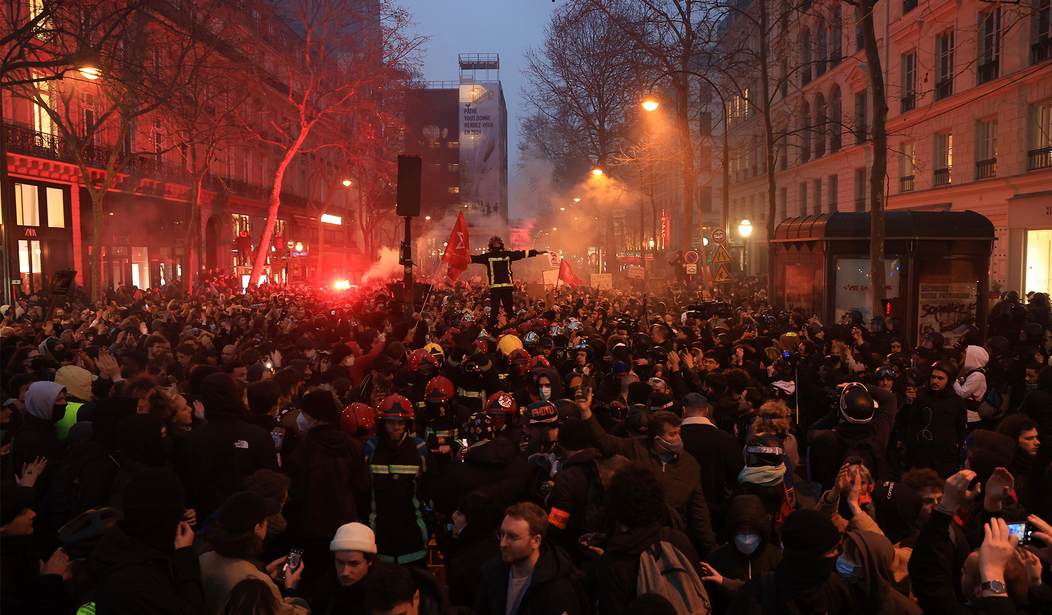Is it possible that the riots and demonstrations in France against the government’s plan to raise the retirement age by two years to age 64 could happen in the U.S.?
It’s not really possible given that the French and American systems are totally different. Besides, the French demonstrations are as much about President Emmanuel Macron and other government leaders maintaining an aloofness from the people that American leaders might want to emulate but would never get away with.
More than 450 people have been arrested and at least 440 members of the security force have been injured during the unrest. Interior Minister Gerald Darmanin said. “There were a lot of demonstrations and some of them turned violent, notably in Paris,” with more than 900 fires lit by protesters in Paris alone, said the minister.
Now that's a protest in #France – The French aren't taking to new world order dictatorship style and Agenda 2030 bullshit! (or being told protesting is banned) #Agenda2030 pic.twitter.com/f996fE5Y40
— Woof Melbourne 🐭🦊 (@woofmelb) March 23, 2023
Macron narrowly survived a no-confidence vote on Monday, and his subsequent actions haven’t helped his standing any. Nineteen conservative deputies deserted Macron in that vote, and without the right, it’s unclear how he’ll be able to get anything done.
Some pension reform opponents are holding out hope that the bill could somehow be reversed. It wouldn’t be the first time that an unpopular law was retracted in the face of popular protest. And the measure still has to pass constitutional muster from France’s Constitutional Council, the country’s highest court. The bill’s tortured journey to becoming law included Macron activating a little-used constitutional article. It was legal, but the court may yet object to the means.
Yet if the government gets its way, as seems probable, it will be a Pyrrhic victory. The damage of the past weeks can’t be undone. Mr. Macron has burned bridges with potential allies, poisoned relations with possible negotiating partners and rallied a majority of the French public against him. To judge from Thursday’s wave of strikes, which hit everything from oil refineries in Normandy to public buses in Nice, the discontent isn’t going anywhere.
Macron has lost the trust of the French public, exhausting whatever goodwill remained after his re-election — which wasn’t much. Macron’s “victory” was at least partly due to the French media terrifying the public of the conservative opposition. The media campaign portrayed Marine Le Pen’s National Rally Party as a cross between Hilter and Donald Trump.
“There’s a form of disconnect,” Laurent Berger, the general secretary of the country’s largest labor confederation, the C.F.D.T., which prides itself on its ability to negotiate and compromise, told the New York Times’ Cole Stangler. “There needs to be an end to this verticality where only a precious few are right and everybody else is wrong.”
With Mr. Macron ignoring pleas to organize a referendum or hold new legislative elections, calls to reform France’s political institutions could grow louder. One remedy, as the historian and political scientist Patrick Weil has suggested, could be to increase the amount of time between the presidential and legislative elections. That would allow French voters — as they did before 2002 — to weigh in on the president’s tenure through de facto midterm elections. The demand from France Unbowed, the left-populist party, to create a Sixth Republic that would rein in the power of the presidency may begin to look more appealing.
A Sixth Republic? The previous five republics emerged from massive unrest, and France isn’t close to that happening — yet. Macron could call for a snap legislative election to try and recover some ground and solidify his position. But if his own position continues to erode, he’ll eventually become a figurehead and may want to resign anyway. In that case, a new presidential election would be called.
Macron insists that the pension reform bill is absolutely necessary. It’s a shame few believe him.










